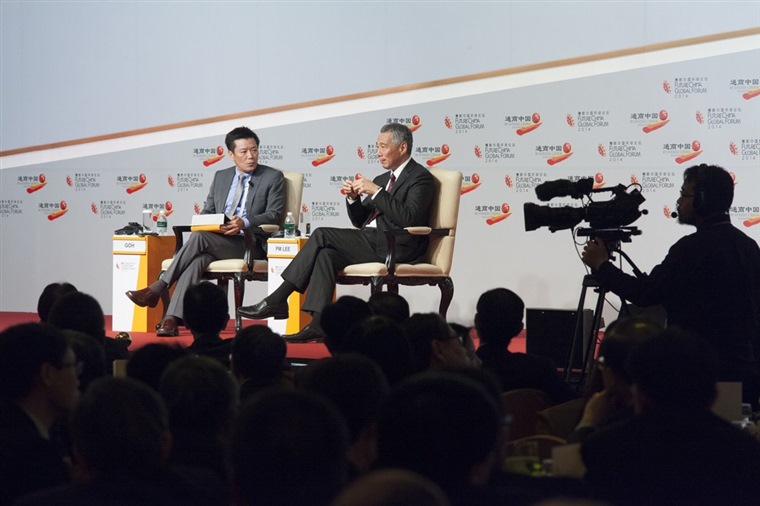China at the Crossroads: The Way Forward
Organised by Business China, the fifth edition of the FutureChina Global Forum (FCGF) commenced on 17 July at The Shangri-la Hotel, Singapore. The two-day Forum brought together more than 60 leading international experts, to share their thoughts on pertinent China issues through a total of 18 plenary sessions and panel discussions surrounding the theme of “China at the Crossroads: The Way Forward”.
FCGF 2014 kick-started with the Opening Plenary on “A growing China in an evolving region: Seeking win-win partnerships”, helmed by Emeritus Senior Minister Goh Chok Tong, Vice Chairman of Boao Forum for Asia and Former Vice Premier of China, Mr Zeng Peiyan, Senior Minister of State Lee Yi Shyan and Executive Vice Chairman, China Center for International Economic Exchanges, Mr Zhang Xiaoqiang on.
In his keynote address, ESM Goh iterated the importance for countries to co-operate in win-win partnerships, “Today, countries are increasingly interdependent. Set against this backdrop, instability in one country or region could have a cascading effect on the rest of the world. Greater integration across complementary areas will increase our societies’ resilience. The promise of an Asian century beckons. But there is much work to do. We need to commit ourselves to win-win partnerships. Only then can future generations enjoy a new century of peace, stability and prosperity.”
Mr Zeng Peiyan, in his keynote speech mentioned that as China is currently at a critical inflexion point, the 4 “R”s, namely Remodeling, Rebalancing, Reforming and Re-engaging, may be the key to her successful overcoming of the middle income trap. Mr Zeng believed that if the above 4 “R”s can be successfully implemented, China’s economy can achieve higher value growth trajectory within a more balanced economic structure.
This year, we are also very honoured to have Business China’s Patron, Prime Minister Lee Hsien Loong, grace the Forum Dinner Dialogue as keynote on 17 July, shedding insights on topics such as Singapore-China relations in the years ahead, as well as areas of expertise that both countries can leverage upon.
In response to one of the questions from the floor, Prime Minister Lee remarked that the openness and drive of the Chinese people is what made China successful. He added that Singaporeans can emulate the Chinese in their thirst for knowledge, their will to improve and learning what others are doing better. Singaporeans also need to develop the drive, energy and impetus to get ahead. Individuals who learn to do better can help to propel the country forward.
The first day concluded with a total of 11 plenary sessions and panel discussions covering topics on the projection of China’s economy; challenges for foreign companies operating in China; the evolving profile of the Chinese consumer; as well as closer looks on political dynamics in Beijing, and opportunities in the high-tech and telecommunications sector.
The second day, 18th July, saw seven more sessions discussing China’s debt issues, changes in China’s economic landscape and China’s role in maintaining the regional peace and stability that is needed for growth.
The Forum concluded with a Closing Plenary on “Rising but still uncertain power: What will this mean for regional and global stability?” with speakers Professor Jin Canrong, Professor and Associate Dean, School of International Studies, Renmin University of China; Professor Lin Chong-Pin, Adjunct Professor, Graduate Institute of Strategic Studies, National Defense University and Former Deputy Defense Minister of Taiwan; Mr Clyde Prestowitz, President of the Economic Strategy Institute and Professor Sun Zhe, Institute for International Studies & Director.
In the session, the experts likened the current phase of China-US ties as a “marriage”. There will still be conflicts from time to time, but it is a marriage all the same, said Professor Jin. Mr Prestowitz next added that it has always been US’ policy to support China’s development. For instance, in the 1990s, the US welcomed China’s entry into the World Trade Organisation.
Professor Lin suggested that the world could better understand China’s position by examining the stance China has taken with regards to Taiwan. It is a relationship which China seeks to dominate without war but with hearts and minds, by leveraging on its economic power, culture heritage, media campaigns and legal instruments. “[China is] holding a spear of reform with a shield of conservatism”, he added.
More than 400 senior business executives, entrepreneurs and top business leaders, policy makers and thought leaders attended this annual Forum, exchanging perspectives on hot-button issues framing China’s future developments.
Seeking Win-Win in Asia – Boao Forum for Asia (BFA) Dinner
In conjunction with the participation of Mr Zeng Peiyan, Vice-Chairman of Boao Forum for Asia (BFA) as a keynote speaker at the opening plenary session of this year’s forum, BFA hosted an exclusive dinner on 16 July for more than 50 local and Chinese business leaders. The dinner was also graced by Vice-Chairman of BFA Mr Zeng Peiyan, BFA Board Member and Singapore Emeritus Senior Minister Goh Chok Tong, Business China Board Advisor Mr Wong Kan Seng, and Secretary General of BFA Mr Zhou Wenzhong.

